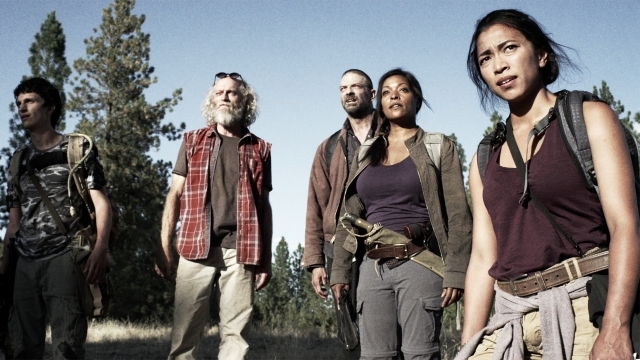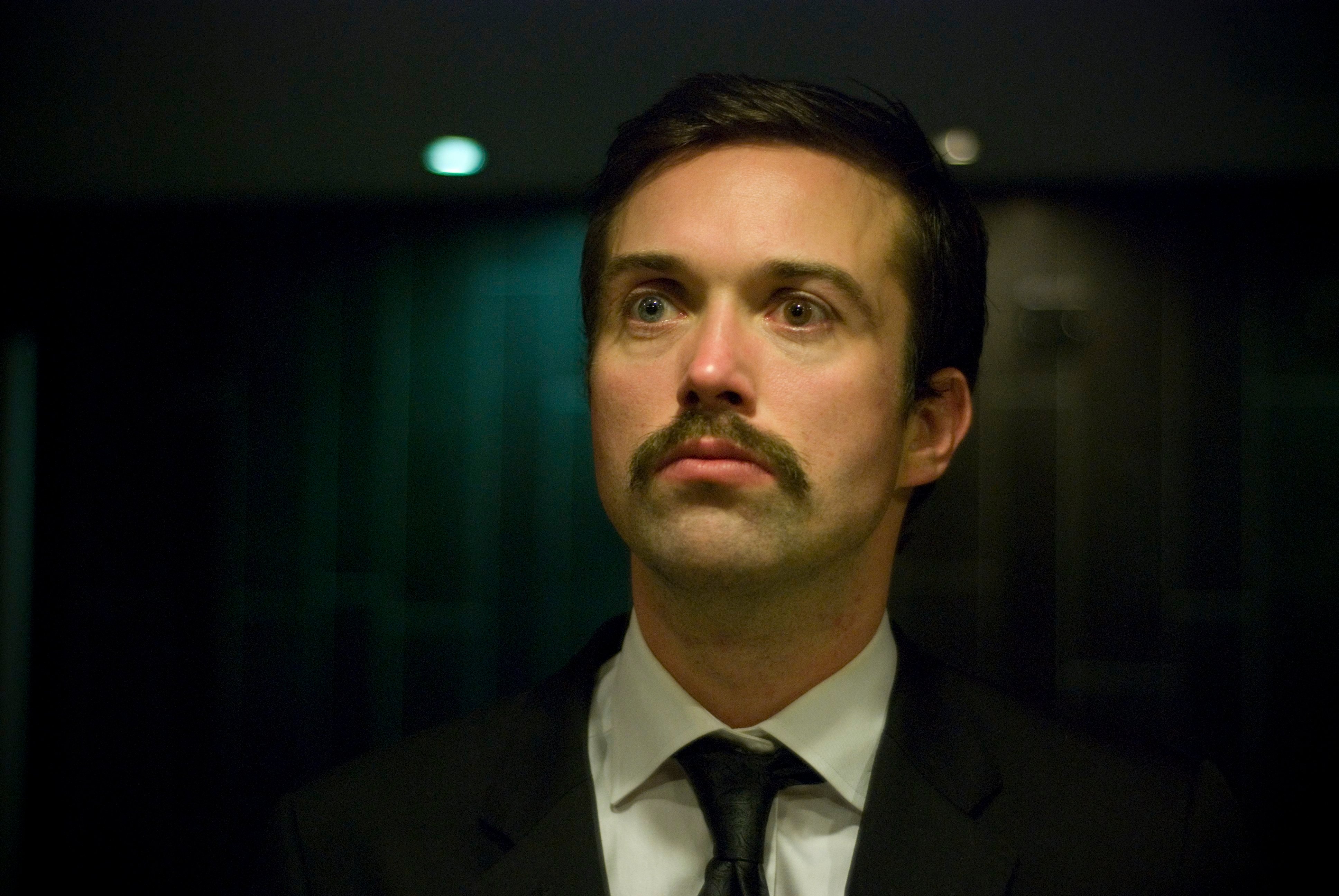Damon Lindelof’s latest TV effort, The Leftovers on HBO (co-created by and adapted from the novel by Tom Perrotta) just hit the halfway mark through its first season on Sunday, and it’s easily the best new show to premiere this summer. This comes with two disclosures: 1. Summers are usually treated more like draughts than harvesting season for TV networks so 2. The competition is usually (and specifically this year) lackluster. For example, this year you have AMC’s disappointingly tone-deaf Halt and Catch Fire, while on FX you have Guillermo Del Toro’s The Strain struggling to decide if it’s good-bad or just bad-bad. Despite a lightweight competition, The Leftovers still holds its title of best new Summer show, a title that is earned despite the show winning it by default.
After each episode I look to recaps across the internet to further the discussion and interpretation of the show, as I do for most shows I watch. But to my surprise, much of the response to this show has been more on the negative side than anything else. I’m not saying that any of their writing is bad, or that criticism is lacking — I’ve seen many understandable and well-versed complaints about the show. It’s just that this show is one that, despite its debatable flaws, we should be giving more thought to, not just shrugging off.
One thing that’s indisputable is the talent of the cast, whose performances are top notch across the board. Justin Theroux, mostly relegated to sillier/heightened types of roles in his career (Mulholland Drive, Your Highness, Wanderlust) gets to play the gateway character for everyone else to bounce off of. What makes him an effective gateway character is that, as the local Police Chief, he’s expected to be unwavering for the town, but you quickly see that he’s just a few frustrations away from losing his sanity. Christopher Eccleston is a perfectly good actor in his own right, but one that Hollywood doesn’t really have a clue what to do with. His biggest roles in America have come in G.I. Joe: Rise of Cobra and Thor: The Dark World. He’s serviceable in these films, but limited. Here he gets to play (with a surprisingly good American accent) a more emotionally troubled character that he can dig into and unravel. However, one of the show’s best weapons hardly ever speaks. Severely underrated character actress Ann Dowd (watch Compliance for reference to her abilities) gets to really shine here as Patti, the silent leader of the Guilty Remnant. Dowd doesn’t spend much time talking, but she doesn’t need to in order to be a magnetic screen presence. She’s able to communicate fervent commitment, anger, heartbreak — the full spectrum of human emotion, just through just her resting face. And when she does talk, the Emmy voters (should) listen up.
The tone of the show is one that is almost unbearably bleak, and will no doubt turn off most viewers. They’re not wrong; this show is tough to handle. Near the end of the most recent episode, titled “Gladys”, Police Chief Kevin Garvey ends up holding a pillow to his face to drown out his tears. That moment right there encapsulates the general mood of this show. This show will seriously bum you out. The series is incredibly depressing, but its sense of existential dread is earned. After every episode, I want to go cry into my suffocating pillow, or take up chain-smoking like the Guilty Remnant because we’re all just wasting our breath. I get it, the bleakness of this show isn’t for everyone, but the challenge of it shouldn’t be mistaken for being an accident.
There is a question among critics about how to approach the show in how well it does/doesn’t marry its more outrageous notions with its down-to-earth look. The gripping, if bonkers, opening credits will certainly throw off a lot of people, as it’s pretty inverse to the grounded hand-held aesthetic the show is shot with. The way it tries to marry both outrageous and intimate moments can be clunky, but it is committed to trying its best to make the marriage work. If anything, the opening credits are there to try to wean you into some of the more outrageous parts of the show. It takes most shows a few episodes to find their balance. The Leftovers may not have found it yet, but no show seems more comfortable with itself teetering like this one does. Because it’s Lindelof, he’s going to play with supernatural elements, and it’s his moves towards the supernatural in The Leftovers that have some rolling their eyes. What makes it interesting, though, is that Lindelof never commits to the confirmed presence of supernatural elements, he just commits to the possibility of them. Do Holy Wayne’s hugs really heal you? Does Scott Glenn’s Kevin Garvey Sr. know something the rest of us don’t? Were those pigeons a sign from God? The show is okay with you making up your own mind on these things, and it’s all the more engaging for it.
Max Richter shows up to do the score for the show, and it benefits immensely from his presence. Hollywood has been using his music to sell emotions and “epic-ness” to audiences in trailers (Prometheus, J. Edgar, To The Wonder and even Need For Speed) for a few years now, so it only makes sense that somebody would take what others do in 2 minutes and have him stretch the magic out over 10 hours. You may scoff at some of the premise of this show, but once Richter’s piano comes in — get ready for the chills. The score does a lot to reign in the audience and stretch their suspension of disbelief for this show.
The biggest thing holding goodwill for this show back is really Lindelof himself. Even after four years, people just aren’t ready to love him again after the finale of Lost. Listen Lost fans, I get it. You gave 6 seasons of your life to this guy and didn’t get any of the answers you were seeking. Not to be indelicate — and not to wholly excuse Lindelof — but you should have seen it coming. At a certain point in season 3 it became clear that Lindelof and Carlton Cuse didn’t have a set endgame in sight, and that when this show did end, it wouldn’t do so on a note of clarity. So with that said, the finale for Lost was fitting unto itself. I’d rather have the polarizing hot mess that the finale was than something that felt safe and comfortable. No matter what Lindelof does, the outrage of the Lost finale will follow him forever. The guy could find a way to successfully bring back Firefly and Freaks and Geeks and would still have a lot of vitriol directed at him for the ending of Lost. But for those that were just cut too deep from the Lost finale, take comfort. Lindelof actually seems to be learning from his mistakes and improving upon his weaknesses.
Lindelof has always been better at asking questions than giving answers. Lost is clearly the biggest example of this. Each answer in that show was like a Hydra head, just creating 3 more questions, and that was why we tuned in each week. It was gripping television; I still remember the way my jaw dropped when, in Season One’s “Deus Ex Machina”, Locke pounded on the hatch door asking for an answer, and a light inside the hatch suddenly turned on. It was truly must-watch television, even if it did everything it could to dodge resolutions. After Lost, Lindelof went on a little stint in Hollywood where, among other studio films, he worked on the screenplay for Prometheus. It was inherent Lindelof, as the first 2 acts presented compelling possibilities only to avoid providing answers for any of it in the 3rd act (I say this as someone who actually really liked Prometheus). Then something strange happened. He fixed World War Z. The film had had well-publicized accounts of the trouble the filmmakers were having in coming up with a suitable ending for the film well into production. They called in Lindelof, honestly one of the last screenwriters they should have called to provide an ending to something. But he did it, rewriting the last third of the film to something much more compelling and interesting — seriously, look at the ridiculous original ending — and helping World War Z turn a loss into a win, becoming one of the biggest surprise hits of last summer. Damon Lindelof finally figured out how to end a story.
Lindelof adopts one of the more intriguing and successful narrative structures that made Lost so gripping by spending certain episodes devoted to just one character. In fact, the best episode of the show so far, “Two Boats and a Helicopter”, did just that, following Reverend Matt Jamison as he struggles to keep his church and faith alive. They have announced that another episode this season will do the same, and hopefully if it gets renewed they will continue that type of narrative structure.
With The Leftovers, the show is essentially a perfect fit for Lindelof. He gets to ask a lot of big questions in this show — Where did 2% of the world’s population go? Was it God? Was it supernatural? Are they coming back? — but the benefit here is that he isn’t beholden to answering those questions. This show isn’t about finding the lost ones, it’s about figuring out to move on and live after such loss by beginning 3 years after the event. I’ve read a few criticisms stating they would rather have seen a show that began with the event, and it could easily make for some entertaining television. However, I would propose that in telling that story, there would be a higher precedence set on answering the premise’s question, therefore giving it a shorter creative lifespan. We start watching shows for the premise — Vampires, Zombies, Dragons, Prohibition, a terminally ill Chemistry teacher making meth — but we stick around to witness the creative possibilities of the premise. The Leftovers is a rare type of show that has already transcended its premise, becoming a show not about what happened to 2% of the population, but how to cope with the existential dread that such an event would create. It’s not about finding answers, it’s about finding ways to adapt.
The 4th episode, “B.J. and the A.C.”, opens with a construction of a toy doll that goes on to become the baby Jesus in Mapleton’s Christmas nativity, only to vanish into thin air. It’s a heavy-handed sort of allegory for the show to make, especially to open with, but man-oh-man does it really mean it. A constant theme throughout this show is being robbed of your faith and personal beliefs — whether it’s God, the goodness of dogs, or the functionality of the office toaster oven — and finding a way to maintain them. So what I’m preaching here is faith. Just have a little faith. Even though Lindelof burned you once, he may be able to reward your faith now if given the chance.








